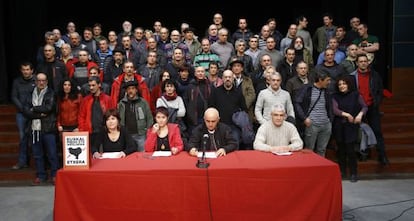Basque abertzale left accuses Rajoy of trying to block peace talks
Former ETA inmates accept responsibility for violence, say they will join the political process Terrorist organization expected to issue a statement over ex-prisoners’ announcement

Just one day after a large group of former ETA inmates publicly announced that it was willing to abide by a democratic process and give up the armed struggle, the Basque abertzale left on Sunday accused the government of Prime Minister Mariano Rajoy of “stonewalling” the peace process.
The abertzale’s main organizations — the Sortu coalition, LAB labor union and Emai youth group — said that thanks to the steps they have made, as well as the commitments announced by former inmates, there is “no stopping the peace” in the Basque Country.
“Euskadi has begun to recognize a new era that is approaching where there is no turning back, but the Spanish government’s stonewalling continues to derail it,” said Sortu spokesman Pernando Barrena in San Sebastián.
ETA, which two years ago announced a definitive ceasefire, is expected to release a statement soon in reaction to fast-moving events, sparked by the terrorist group’s former inmates, EFE news agency reported on Sunday.
In an unprecedented move, former ETA inmates — including 63 recently given early release from jails following a decision by the European Court of Human Rights — announced in Durango on Saturday their “total commitment” to join the abertzale’s political goals: “A decision to abandon the armed struggle for good.”
The announcement was read in Spanish by José Antonio “Kubati” López Ruiz, who was sentenced to 1,210 years for 13 murders but only served 26 years after the Strasbourg court shot down the so-called Parot Doctrine, the strict sentencing guidelines that had been used by Spain’s penitentiary authorities.
Behind López Ruiz, some of the most notorious former ETA terrorists stood firm listening to the statement. They included Jesús María Zabarte, known as the butcher of Mondragón, and Miguel Turrientes, who once served in ETA’s leadership during the 1990s. In all, the inmates were convicted of committing more than 150 crimes related to ETA terrorism.
“We accept all of our responsibility relative to the consequences of the armed conflict,” said López Ruiz, reading from a statement. No questions from reporters were allowed.
The announcement came exactly one week after the ETA prisoners collective EPPK released a taped statement recognizing the legality of Spain’s penitentiary system, as well as expressing its agreement for individual prisoners to negotiate individual early release terms, and rejecting the violence, “suffering and multilateral damage caused” by their terror campaign.
“This hasn’t been an easy step,” said Barrena, “and there haven’t been easy discussions. But we applaud all that has been accomplished.”
The Rajoy government, as well as many other political sectors, has received the EPPK’s statement cautiously, while at the same time reiterating its calls for ETA to permanently disband and lay down its arms.
“Durango is the biggest embarrassment in all of democracy,” the Terrorism Victims Association (AVT) said in a statement regarding the meeting, which was given permission to go ahead by High Court Judge Santiago Pedraz.
Laura Garrido, the spokeswoman for the Basque Popular Party, said that gathering was trying “to downplay and manipulate the reality by presenting killers as heroes.”
It is expected that the more than 500 ETA inmates who are still in prison in Spain and France will begin petitioning penitentiary authorities in both countries for transfers to be allowed to serve out their time in Basque Country jails.
Basque Country regional premier Iñigo Urkullu, who has also called on ETA to lay down its weapons and disband, said that he will meet at the end of the month with Rajoy to try to convince him to change the government’s penitentiary policies, thus allowing the inmate transfers.
Tu suscripción se está usando en otro dispositivo
¿Quieres añadir otro usuario a tu suscripción?
Si continúas leyendo en este dispositivo, no se podrá leer en el otro.
FlechaTu suscripción se está usando en otro dispositivo y solo puedes acceder a EL PAÍS desde un dispositivo a la vez.
Si quieres compartir tu cuenta, cambia tu suscripción a la modalidad Premium, así podrás añadir otro usuario. Cada uno accederá con su propia cuenta de email, lo que os permitirá personalizar vuestra experiencia en EL PAÍS.
¿Tienes una suscripción de empresa? Accede aquí para contratar más cuentas.
En el caso de no saber quién está usando tu cuenta, te recomendamos cambiar tu contraseña aquí.
Si decides continuar compartiendo tu cuenta, este mensaje se mostrará en tu dispositivo y en el de la otra persona que está usando tu cuenta de forma indefinida, afectando a tu experiencia de lectura. Puedes consultar aquí los términos y condiciones de la suscripción digital.









































